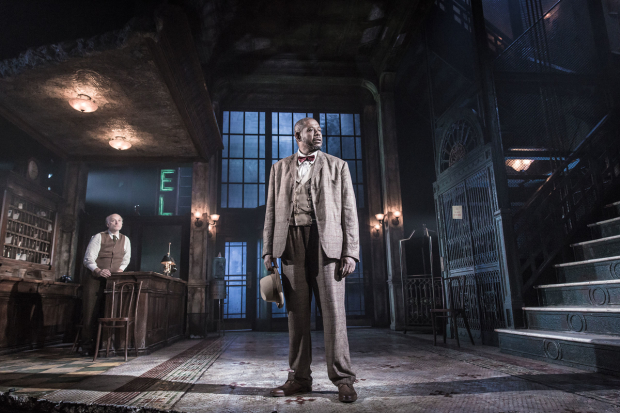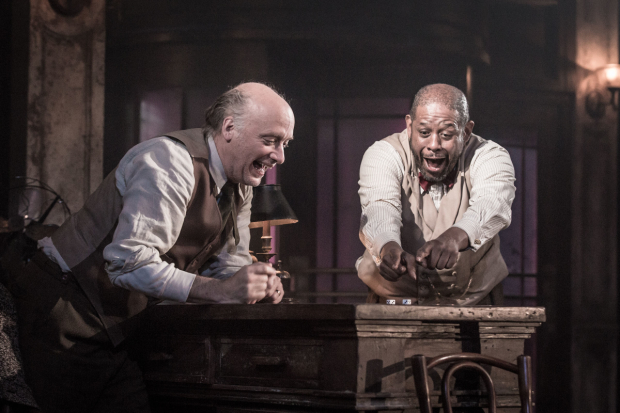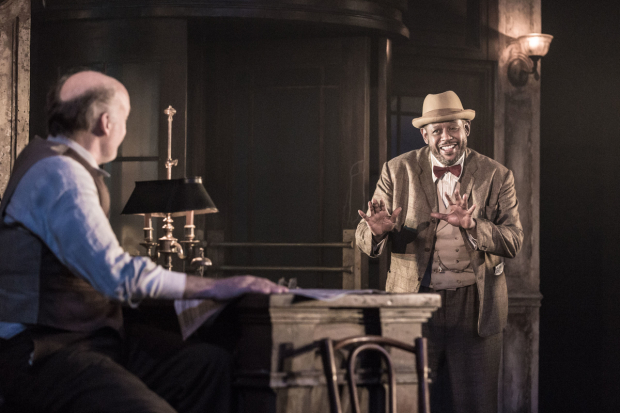
(© Marc Brenner)
"Life's a gamble," the marquee for Hughie at the Booth Theatre states. So, too, is casting a film star with little theatrical experience in a Eugene O'Neill drama that is essentially a monologue. In Michael Grandage's new revival of O'Neill's one-act, which stars Oscar winner Forest Whitaker, the bet only pays off intermittently. Whitaker may be one of the great cinematic character actors of our generation, but only rarely during his 55-minute Broadway debut does he prove himself a match for the unique difficulty of the stage.
In O'Neill's words, Hughie was "written more to be read than staged," part of an unfinished cycle of one-acts about the dead collectively titled By Way of Obit. Penned in the early 1940s (and not produced until 1958, in Sweden), the work follows two lost souls, a small-time gambler named Erie Smith and a night clerk named Charlie Hughes. The setting is a formerly lavish West Side hotel built between 1900 and 1910 that, in 1928 when the play is set, has become nothing better than a flophouse, "a third class dump, catering to the catch-as-catch-can trade."
Erie (Whitaker) is one of those guys, returning from a four-day bender that began after the death of his best pal, Hughie. Hughie was the venue's old night clerk, who would spend the wee small hours gambling and talking with his blustery friend. Erie believed himself a big man in Hughie's eyes, thrilling him with stories of important dice games and the beautiful blonde follies girls he would bring home to bed.
With Hughie gone, Erie has not just lost his only friend, but it seems all of his luck and self-esteem, too. The only person left is Charlie Hughes (Tony winner Frank Wood), the hotel's new night clerk who is so checked-out that, in O'Neill's words, he has "even forgotten how it feels to be bored." As Erie talks his ear off, drifting further and further into a personal hell of isolation, Charlie daydreams his way into a similar spot. But the men just may find themselves making a connection they never expected.

(© Marc Brenner)
Given the sheer amount of words he has to deliver, Erie is a daunting role for any actor (in the past, he has been played by the likes of Jason Robards and Al Pacino), but it's especially a beast for someone like Whitaker, who hasn't been onstage since his college years three decades ago. Unfortunately, Whitaker's inexperience is clearly evident throughout the first two-thirds of the evening. He speaks in an actor's version of a Noo Yawk dialect, mumbles far too often, and delivers his lines by rote rather than living them organically. At points it even appears as if he's simply trying to remember what comes next.
Yet as we come toward the end, when Erie starts recounting his memories of Hughie and sharing his platonic affection for the deceased, Whitaker suddenly comes to life. The artifice in his line readings virtually disappears as Erie describes his acute loneliness. Whitaker's physicality, particularly the way he smiles with a hint of embarrassment every time he realizes that Charlie isn't listening to a thing he says, is extremely surefooted and thoroughly heartbreaking. It makes one wonder if he'd find his way into the character as a whole if he would only drop all the trappings of delivering a performance.
Wood has an equally difficult assignment: While in the published text O'Neill provides Charlie with a vast inner monologue, onstage he has to sit there and appear to let his mind wander while Erie talks a blue streak. In his mostly silent role, Wood is as good as ever, making the most of being so mentally unplugged that he may as well be in the same pine box as his predecessor. (And he earns hearty laughs when he occasionally springs back to life to greet his stage companion with a blank stare.)
Physically, this production of Hughie is one of the most beautiful shows currently on Broadway. Scenic and costume designer Christopher Oram and lighting designer Neil Austin masterfully bring O'Neill's fleabag hotel to life, evoking the old sepia-toned photographs one could find tucked away in their grandmother's armoire. Austin's ghostly, haze-filled lighting seems to add a fine sheen of dust onto both Oram's beautifully hulking set and the impressively specific wardrobe he created for the two characters. Adam Cork provides a vivid soundscape of sirens and subways, a world fully alive just outside the revolving doors.
Grandage keeps the action moving smoothly, though his choice to divide the play into sections, separated by a not particularly subtle underscoring of just how alone Erie and Charlie are in the world, feels unnecessary. One could also raise the question as to why he and the production team chose not to pair the play with another work, as is a frequent occurrence to beef up the duration of the evening (a running time of under an hour is awfully paltry). In the end, however, the main concern is Whitaker's work. If only he could get the first half of his performance up to the level of the second, this Hughie would be a safe bet.

(© Marc Brenner)








